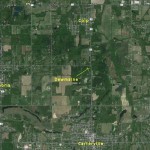Dewmaine, the village along the north line between sections 34 and 35 of Blairsville Township, dates itself by its name. The two syllables that were on every tongue in the spring of 1898; “Remember the Maine” and Admiral Dewey at Manila Bay.
 In Williamson County, union labor was making its first stand. Samuel T. Brush, general manager of the St. Louis and Big Muddy Coal Company, refused to allow his mines north of Carterville to lie idle during a strike. His son, James C. Brush, brought a trainload of Negro workers from Jellico, Tennessee and arrived at the mines May 20, 1898, three weeks after the battle of Manila Bay. These miners and their families lived on the mine property and Mr. Brush named the little settlement Dewmaine.
In Williamson County, union labor was making its first stand. Samuel T. Brush, general manager of the St. Louis and Big Muddy Coal Company, refused to allow his mines north of Carterville to lie idle during a strike. His son, James C. Brush, brought a trainload of Negro workers from Jellico, Tennessee and arrived at the mines May 20, 1898, three weeks after the battle of Manila Bay. These miners and their families lived on the mine property and Mr. Brush named the little settlement Dewmaine.
The former miners returned to work as they were needed after July 1, and the mines worked steadily until May 15, 1899 when a strike was called. More Negro workers were brought in, this time from Pana. Their train was fired on and one woman was killed. Later five Negroes were killed at the Illinois Central station in Carterville. The trials rising from these troubles were taken to Vienna on a change of venue, and the men indicted were acquitted. Richmond R. Fowler was the Williamson County State’s attorney and a brilliant array of counsel appeared on both sides.
Mr. Brush maintained his position firmly and with great personal courage. At one time he mounted a slack pile at Dewmaine and addressed the miners. He remarked on the threats to kill him, and pointed out that he made an excellent target if anyone wanted to start shooting. But his was a losing fight, and union labor won in the end. The Brush and Colp mines, the last non-union mines in the county, were sold in 1906 to the Madison Coal Corporation. Sam Brush addressed his miners, took his guards and left. The new manager announced a new policy of no man’s working without a union card. Though his mines are worked out as far as the number six seam can be mined, the name of Sam Brush remains on the county map with Brush junction.
Dewmaine became a post office on March 6, 1901; the first postmaster was Marshall E. Batson who worked in the company store. He came from Carbondale, and was a cousin of Dan Batson, bodyguard to Sam Brush through the troubled days. Marshall E. Batson married a daughter of W.C. Rayburn of Carterville, and returned to Carbondale where he operated a barber shop.
The Negroes of Dewmaine have integrated their lives until they form a sound and self-sufficient community. Dr. A.W. Springs proved his inestimable worth as their leader. The doctor chose Dewmaine as his home in 1908, when a classmate at Fisk University told him of Rev. C.C. Philip’s work in the Baptist Church at Dewmaine. The Dewmaine troop of Boy Scouts, the first in the county, has trained the entire community to high ideals of citizenship, and Doctor Springs ranked as an Eagle Scout. His work in rescue and resuscitation of miners in the Royalton explosion October 17, 1914 earned Doctor Springs the medal of honor presented by the Joseph A. Holmes safety association and the gratitude of the entire community.
(Extracted from Pioneer Folks and Places, Barbara Barr Hubbs, 1939, on sale at the Williamson County Museum)
